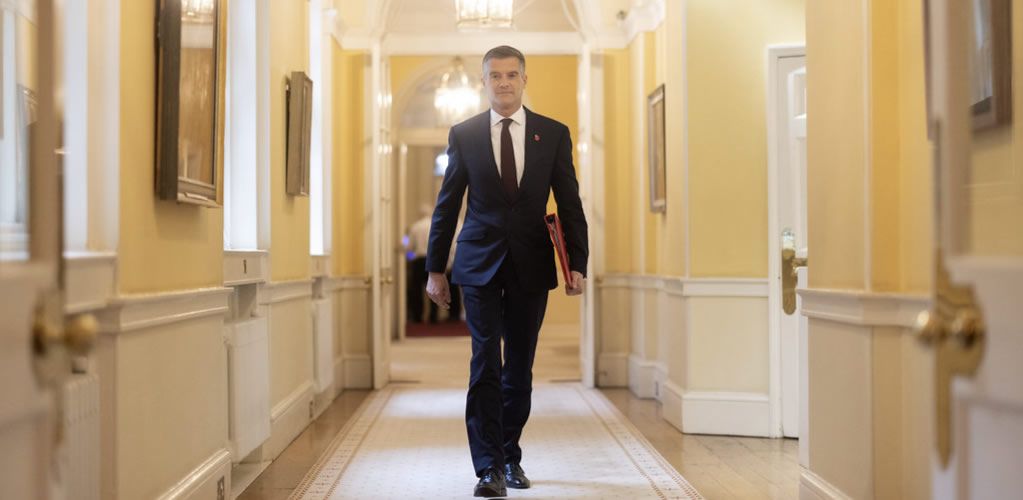The government debunked a 15-minute city conspiracy... then endorsed it
The Levelling up Department’s own guidance contradicts comments by Transport Secretary Mark Harper at the Conservative Conference.

The Levelling up Department’s own guidance contradicts comments by Transport Secretary Mark Harper at the Conservative Conference.
T he government has endorsed a conspiracy about “15-minute cities” as part of its major policy announcement prioritising car owners – despite having already debunked the theory.
Speaking to the Conservative party conference in Manchester today, Transport Secretary Mark Harper called himself “proudly pro-car,” while describing the concept of 15-minute cities – where local amenities are located within a 15-minute walk or cycle – as “sinister”.
“What is sinister, and what we shouldn’t tolerate,” said Harper, “is the idea that local councils can decide how often you go to the shops, and that they can ration who uses the roads and when, and that they police it all with CCTV.”
There has been opposition to 15-minute cities from those who say they are a front for “everlasting surveillance” and designed to restrict people’s freedom.
But these entirely made-up claims have been widely debunked, including by the government itself.
Responding to a petition in March that demanded councils hold referendums before implementing 15-minute city plans, the Department of Levelling Up, Housing and Communities (DLUHC) said that “15-minute cities aim to provide people with more choice about how and where they travel, not to restrict movement.”
It added that “the 15-minute cities concept is not a national planning policy” but is part of a framework that aims to promote “walking, cycling and public transport use, so that patterns of movement, streets and parking contribute to making high-quality places”. The response also said the framework aims to promote the delivery of sustainable infrastructure, “ensuring key services are located close to development and offering a genuine choice of transport modes”.
The DLUHC also previously handed out £20m in levelling up funding for a 15-minute neighbourhood project in Newham, east London.
Harper’s announcement was followed by the publication of the government’s “plan for drivers”, which vows to “stop local authorities using so-called ‘15-minute cities’ to police people’s lives”. The policy also sets out how the government will restrict powers for councils to introduce 20mph roads and seek to reduce the hours that cars are banned from bus lanes.

Rishi Sunak is expected to focus on these policies in his speech to the party conference on Wednesday.
Rishi Sunak is expected to focus on these policies in his speech to the party conference on Wednesday, where he will try and whip up support amid a divided party and dwindling polling.
As reported by openDemocracy on Friday, the majority of drivers support 20mph speed limits, according to the government’s own research.
And there are real dangers to promoting conspiracies such as the 15-minute cities theory, Labour MP Charlotte Nichols has said.
Responding to Harper’s speech, she told openDemocracy:
“Having run out of road and ideas, Tory ministers are now openly legitimising dangerous and debunked conspiracy theories – fuelling the kind of ugly protests we've seen in Liverpool and London, and which drives a lot of the harassment and abuse of MPs both online and in person.
“It’s grossly irresponsible, demeans their office, and threatens the safety of their colleagues.”
The 15-minute city conspiracy is likely to be linked to anti-vax, anti-lockdown group Together Association. In April, its co-founder wrote an article in the Telegraph claiming 15-minute cities were “the dungeons of state control.”
Many Tory candidates in this year’s local elections also latched onto the concept and in February, MP Nick Fletcher told Parliament he did not support the “international socialist concept” of 15-minute cities as they would “cost our personal freedom”.

Sources:
▪ Text: This piece was first published in openDemocracy and re-published in PMP Magazine on 2 October 2023. | The author writes in a personal capacity.
▪ Cover: Flickr/Number 10. (Licensed under a Creative Commons Attribution-ShareAlike 4.0 International License.)






[Read our Comments Guidelines]